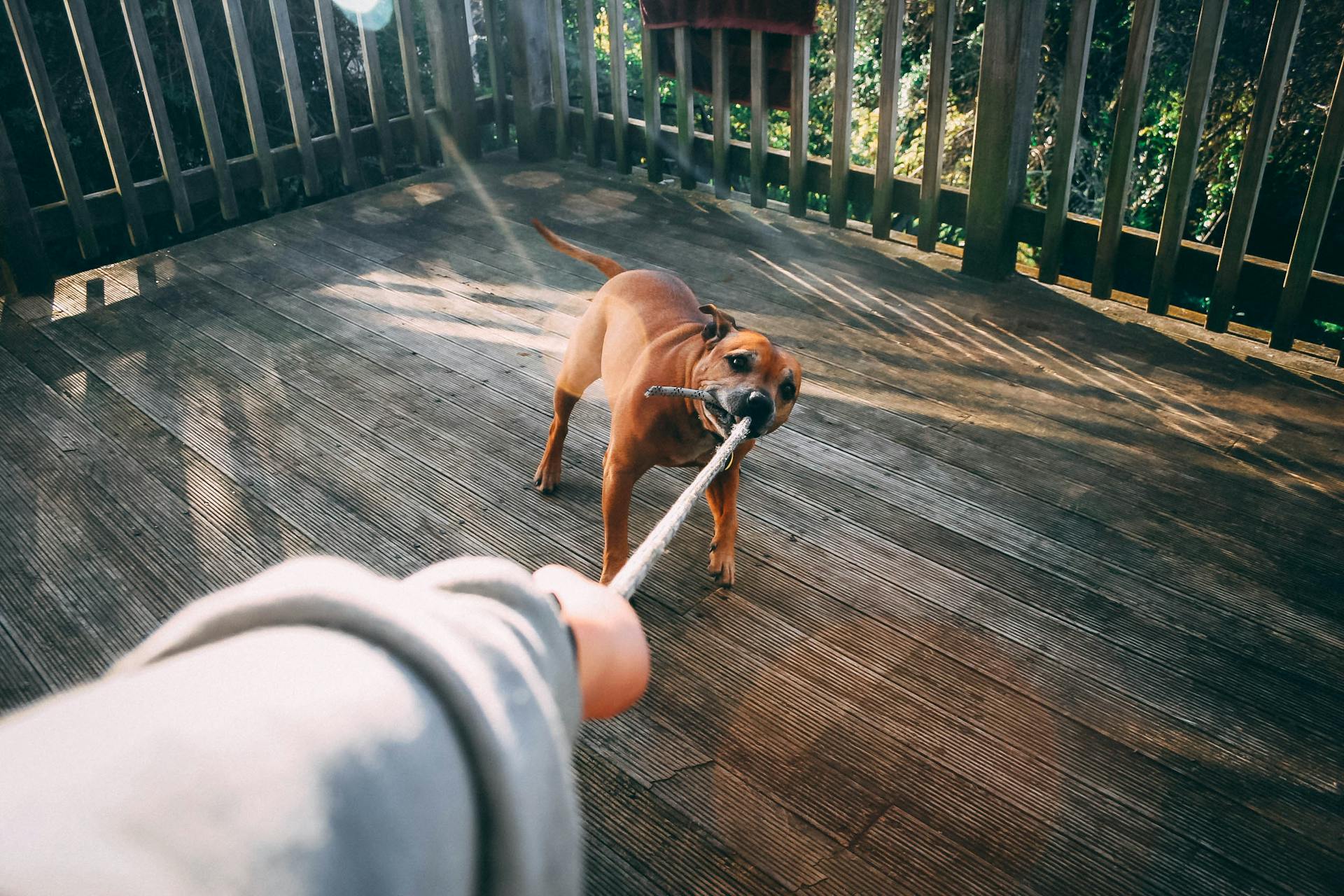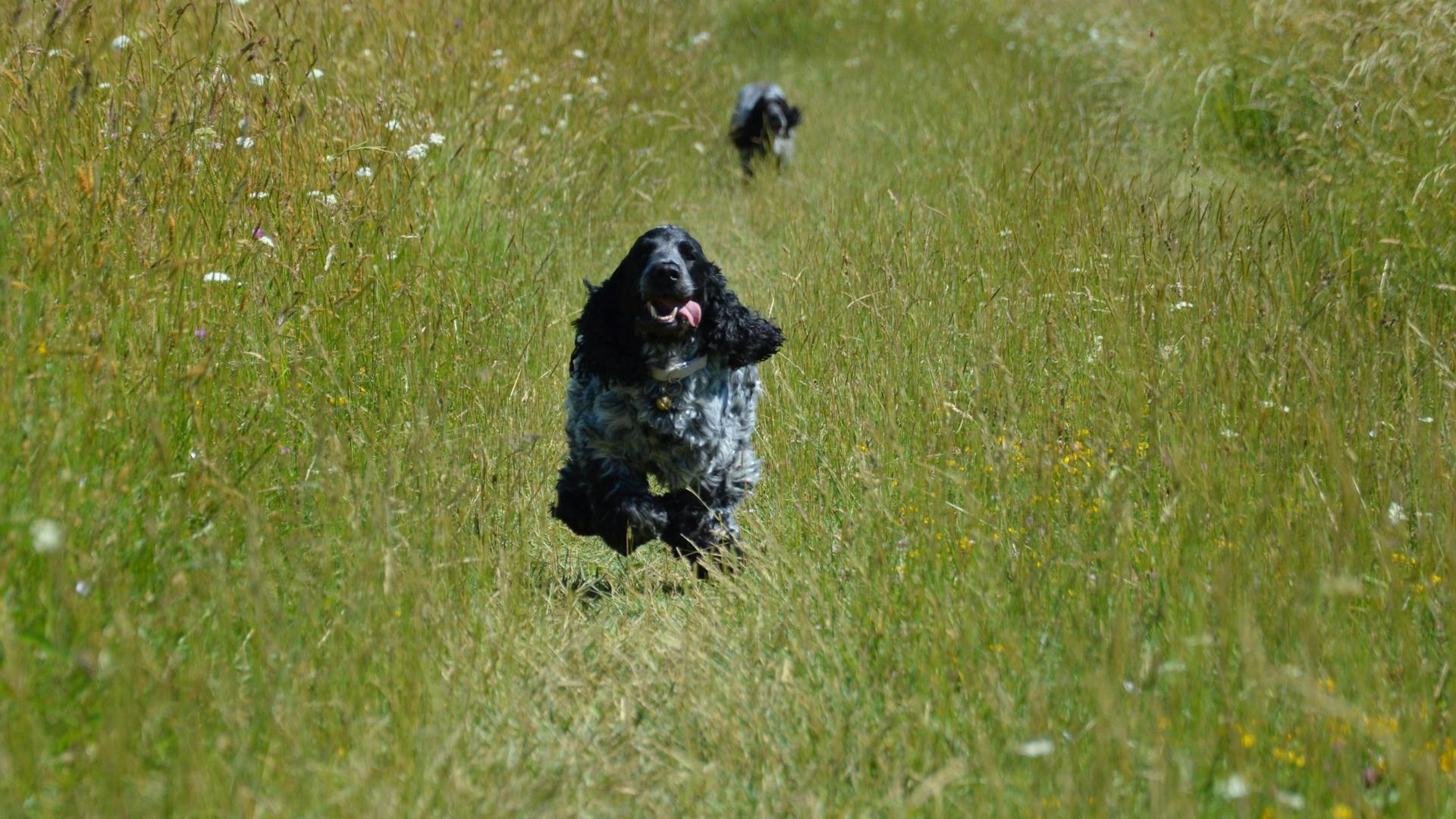
Diagnosing Cocker Rage Syndrome can be a challenge, but it's essential to identify the condition early on. According to research, Cocker Spaniels with this syndrome often exhibit a combination of aggression, fear, and anxiety.
A definitive diagnosis is typically made through a combination of behavioral observations and physical examinations. Veterinarians may also use tools like the Canine Behavioral Assessment and Research Questionnaire (CBARQ) to assess a dog's behavior.
Symptoms can range from mild to severe, and may include growling, snapping, and even biting. Some dogs may also exhibit avoidance behaviors or become withdrawn.
In many cases, Cocker Rage Syndrome is linked to genetic factors, particularly in the Cocker Spaniel breed.
Readers also liked: Cockapoo Rage Syndrome
What Is Cocker Rage Syndrome?
Cocker rage syndrome is a serious condition that affects Cocker spaniels.
It's characterized by sudden onset aggression, which is not an acceptable behavior for any dog, let alone a beloved pet.
Some Cocker spaniels are more prone to this condition than others, and it's essential to be aware of the risk.
Although breeders have taken steps to reduce the incidence of rage syndrome in Cocker spaniels, careful breeding is still required.
The condition can be challenging to diagnose, but if you suspect your Cocker spaniel is experiencing rage syndrome, it's crucial to seek professional help.
Anti-epileptics may be used to treat the condition, but this should only be done under the guidance of a veterinarian.
Suggestion: Rage Syndrome in Dogs Symptoms
Diagnosis and Treatment
Diagnosing Cocker Rage Syndrome can be a challenging process, often taking a combination of veterinary expertise and behavioral analysis. A veterinarian may perform a physical or neurological exam, and order blood tests or imaging techniques to rule out any underlying medical issues.
If your veterinarian suspects that your dog has Cocker Rage Syndrome, they may recommend seeking the advice of an animal neurologist. It's essential to work with a skilled and knowledgeable professional to determine the best course of action.
Rage syndrome is often misdiagnosed, and a diagnosis may be disputed and reclassified. Monitoring your dog's behavior before, during, and after aggressive episodes can help to determine if your dog is experiencing rage syndrome.
Diagnosing the Symptoms

Diagnosing the symptoms of rage syndrome in your Cocker Spaniel can be a challenging task, but it's essential to identify the underlying issue to provide the right treatment. Medical problems, hormones, or pain can cause aggression in dogs, so it's crucial to rule out any underlying medical conditions.
Your vet may perform a physical or neurological exam, and order blood tests, a urinalysis, or imaging techniques to look for any abnormalities. They may also refer you to an animal neurologist for further evaluation.
To help your vet diagnose rage syndrome, take note of everything that happened before, during, and after an aggressive episode. This can include triggers, stimuli, and any behavioral changes that occur before or after the episode. Even better, if you can get it on video, but that's not always straightforward.
Rage syndrome is diagnosed when there are no discernable triggers or reasons for the aggression, and there are periods of depression or behavioral changes that occur before or after the episodes. Monitoring and reporting your dog's behavior can help to discern rage syndrome from other forms of aggression.
Here are some common signs and symptoms of rage syndrome in Cocker Spaniels:
- Alteration in behavior
- Depression
- Aggression that is violent and uncontrollable
- Aiming at a target
- Whimpering
These symptoms can include behavioral changes, depression, violent and uncontrolled aggression, lunging toward targets, growling, snarling, barking, biting and snapping, baring teeth, and curling lips.
Treatment Options

If your dog has been diagnosed with idiopathic aggression, treatment can be challenging and often unsuccessful.
Epileptic medication may be an option for small dogs with a sudden onset of aggression, but every animal responds differently to medication.
A full medical examination by your DVM is essential to rule out any underlying medical problems that could be causing the aggression.
If idiopathic aggression is suspected, a veterinary behaviorist can help determine the best course of treatment, which may include medication like phenobarbital.
Phenobarbital can help manage the condition, but it's unclear if the results are due to the sedative effect of the drug or an actual therapeutic effect.
A good behavior modification program, applied by a committed owner in consultation with a capable behavior professional, can help decrease and/or resolve many aggression cases.
Every member of the family needs to understand the condition and learn to recognize any behavioral changes that may signal an aggressive event is about to occur.
Anticonvulsant medication, such as phenobarbital, can stop episodes characteristic of rage syndrome, but may require lifelong treatment with periodic blood testing to monitor the results and side effects.
Constant monitoring of your dog's behavior will also be needed to ensure the safety of both you and your dog.
Intriguing read: Treatment of Degenerative Myelopathy in Dogs
Treating Idiopathic Aggression
Treating Idiopathic Aggression is a challenging and delicate process. First, it's essential to rule out any underlying medical issues that could be causing the aggression, which can be done with a full medical examination by a DVM.
To determine if your dog has idiopathic aggression, a behavior consultant can help you identify the underlying cause of the behavior. They can also help you develop a behavior modification program to address the aggression.
If a behavior consultant confirms that your dog has idiopathic aggression, it's crucial to consult with a veterinary behaviorist. They can help you determine the best course of treatment, which may include medication such as phenobarbital.
It's essential to note that every dog responds differently to treatment, and some may not respond at all. In some cases, euthanasia may be considered to ensure the safety of those around the dog.
Here are some key points to consider when treating idiopathic aggression:
- Medical issues must be ruled out before treatment begins.
- A behavior consultant can help identify the underlying cause of the aggression.
- Phenobarbital may be prescribed to help manage the aggression, but its effectiveness is unclear.
- Euthanasia may be considered in severe cases where the dog's aggression cannot be managed.
Treating idiopathic aggression requires patience, persistence, and a commitment to working with a veterinary behaviorist and a behavior consultant. With the right approach, it's possible to develop a management plan that ensures the safety of both your dog and those around them.
Understanding Aggression
Aggression in dogs is often misunderstood, and it's essential to understand the different types of aggression to address the issue effectively. Cocker rage syndrome, also known as idiopathic aggression, is a condition that's still not fully understood.
Idiopathic aggression, as some experts call it, is a sudden and violent outburst of aggression that can't be triggered or induced. It's not related to resource guarding, dominance, or other forms of aggression that can be recreated in a research setting.
Some researchers believe that idiopathic aggression might be related to seizures, brain damage, or genetics. However, the exact cause remains unknown, and more research is needed to understand this complex condition.
The age of onset for idiopathic aggression is often between 1-3 years, which coincides with the development of status-related aggression and idiopathic epilepsy. This makes it challenging to diagnose and treat.
Behaviorists have proposed various theories to explain idiopathic aggression, including damage to the brain area responsible for aggressive behavior and status-related aggression triggered by subtle stimuli. However, these theories are still speculative, and more research is needed to confirm them.
Here are some common signs and symptoms of idiopathic aggression:
- Violent and uncontrollable aggression
- Behavioral changes
- Depression
- Lunging toward targets
- Growling
- Snarling
- Barking
- Biting and snapping
- Baring teeth
- Curling lips
It's essential to note that these symptoms can be similar to those of other forms of aggression, such as dominance aggression or resource guarding. If you suspect your dog is experiencing idiopathic aggression, it's crucial to seek the advice of a veterinarian or a certified animal behaviorist.
Table: Common Triggers for Aggression in Dogs
Keep in mind that these triggers can be different for each dog, and it's essential to understand your dog's individual needs and triggers to address aggression effectively.
Other Breeds and Management
Cocker Spaniels aren't the only breed to experience mental lapse aggression. However, this condition is more prevalent in cockers due to a genetic mutation that makes them more prone to being startled by sudden noises or movements.
Other breeds may exhibit similar traits, but it's essential to note that each breed has its unique characteristics. For example, some breeds may be more reactive to touch or movement, while others may have a stronger prey drive.
It's worth considering that a mutation in the genes of Cocker Spaniels makes them particularly sensitive to being touched from behind, as it's something they don't see coming.
See what others are reading: Rage Syndrome Dog Breeds
Other Breeds Affected

Cocker Spaniels are not the only breed of dogs that have this condition, as other breeds can also be prone to mental lapse aggression.
However, Cocker Spaniels are more susceptible to this issue due to a genetic mutation that makes them easily startled by sudden noises or movements.
Some breeds may be more prone to feeling threatened when touched from behind, similar to Cocker Spaniels, because it's an unexpected occurrence.
Management and Worst-Case Planning
Managing a dog with rage syndrome requires constant monitoring of behavior to prevent aggressive episodes. This means being aware of warning signs that might signal an attack.
Family members need to know what to look for, so they can help keep everyone safe. It's essential to determine how to handle the dog if an episode of rage occurs.
Episodes of rage can be brief, but they can be very harmful, even deadly if a child is involved. This is why it's crucial to take precautions.
If the problem cannot be managed, euthanasia might be the only option to keep everyone safe. This is a difficult decision, but it's one that needs to be considered.
It's not safe or fair to expose family members, friends, and yourself to the possibility of an attack. This is why planning for the worst-case scenario is so important.
Theories and Recovery
Recovery from cocker rage syndrome is possible, but it requires careful management and lifelong monitoring. Some dogs may experience improvement with treatments, while others may still retain their aggressive behaviors.
Administering medication and regular testing can help manage symptoms, but owners must tailor their approach to their dog's needs. Lifelong treatments and monitoring are often necessary to ensure the safety of everyone in the household.
Rage syndrome has a potential genetic component, so it's recommended that affected dogs are not bred. This can help prevent the condition from being passed on to future generations.
Idiopathic Aggression Theories
Idiopathic aggression is a complex and poorly understood condition, and researchers have been unable to agree on a clear cause or definitive diagnosis. Some studies have suggested that abnormal electroencephalogram readings may be a contributing factor, but not all dogs with idiopathic aggression have shown these readings.
Researchers have also proposed that damage to the brain's aggressive behavior area may be a cause, but this theory is still speculative. Another theory is that idiopathic aggression is actually a manifestation of status-related aggression triggered by subtle stimuli.
The fact that idiopathic aggression cannot be induced or reproduced makes it extremely difficult to study and understand. Unlike other behaviors like resource guarding, which can be easily induced in a clinical setting, idiopathic aggression is unpredictable and violent.
Some experts believe that seizures may be part of the problem, as dogs with idiopathic aggression often exhibit confusion following or prior to an episode. However, not all dogs with idiopathic aggression have abnormal EEG readings, which makes it challenging to diagnose and treat.
Here are some possible causes of idiopathic aggression, as suggested by researchers:
- Abnormal electroencephalogram readings
- Damage to the brain's aggressive behavior area
- Status-related aggression triggered by subtle stimuli
- Seizures or partial complex seizures
It's essential to note that idiopathic aggression is a rare and dangerous condition, and it's crucial to prioritize safety and well-being around dogs with this condition. If you suspect your dog has idiopathic aggression, consult with a veterinary behaviorist or an animal behavior consultant for proper guidance and support.
Recovery
Recovery can be a long and challenging process for both dogs and their owners.
Recovery is fair, as some dogs can experience improvement with treatments, while others may still retain their aggressive behaviors.
Lifelong treatments and monitoring are often necessary to ensure the safety of everyone in the household.
Your dog may need to be administered medication and taken in for periodic testing to manage the symptoms of rage syndrome.
As there may be a genetic component to this condition, it's recommended that affected dogs are not bred to prevent the condition from being passed on to future generations.
Final Thoughts
Rage syndrome can be a challenging condition for dog owners to navigate. It's essential to understand that it can be caused by a genetic disorder or a condition like epilepsy that triggers unpredictable outbursts of aggression.
Some forms of rage syndrome can be misdiagnosed as other aggressive behaviors, which is why it's crucial to watch for warning signs before a diagnosis is made.
Medications may help manage rage syndrome, but in some cases, tough decisions may need to be made to ensure the dog's safety and well-being.
Frequently Asked Questions
What are the early signs of cocker rage?
Sudden, unprovoked attacks can be a sign of Cocker Rage, often occurring without warning while the dog is sleeping or relaxed. Dilation of the eyes and confusion during an attack are also common indicators
How do you fix rage syndrome in dogs?
To manage rage syndrome in dogs, consider working with a qualified behaviourist or trainer to implement a behaviour modification program, and medication may also be prescribed to help manage aggression. With the right approach, you can help reduce the frequency and intensity of aggressive episodes in your dog.
Featured Images: pexels.com


